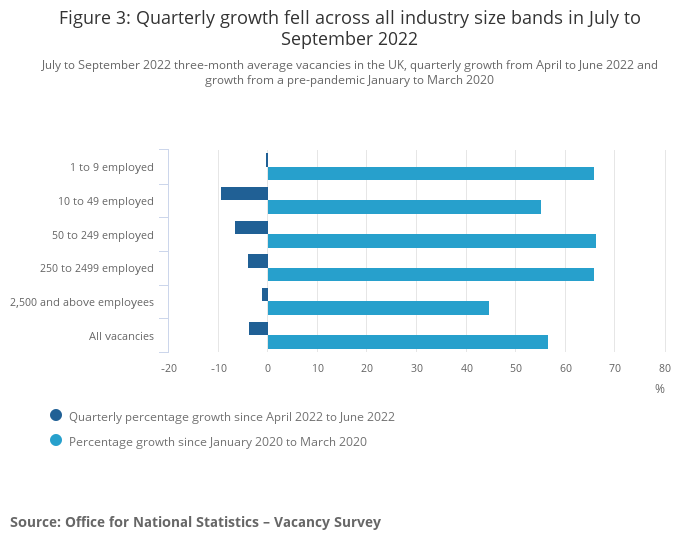Recruitment News: October 2022

The job market has been in a growth state, with job vacancies outstripping candidates. However, with the cost-of-living crisis, a predicted economic downturn, and (soon to be) two new Prime Ministers within 60 days, there are signs of the end of the boom or at least a return to the steady and balanced job market that existed pre-covid.
According to figures from the Office for National Statistics (ONS) Vacancies and Jobs in the UK: October 2022 report, July to September 2022 saw job vacancies decrease by 46,000, a quarterly fall of 3.6%. However, vacancies are 56% higher than pre-coronavirus levels (January to March 2020) and 10.3% higher than the level one year ago.
In the period June to August 2022, the figures show that a status quo has almost been achieved, with 0.9 people unemployed per job vacancy.
Job Vacancies By Business Sector

Three business sectors continued to show growth in the number of job vacancies posted when comparing Q3 to Q2. In Q3, these sectors were Public Admin and Defence (+4.1%), Education (+2.8%), and Human Health and Social Work (+2.5%).
The quantity of job vacancies in Construction remains level.
Five business sectors showed a reduction in job vacancies. These sectors were Wholesale and Retail Trade, including Automotive (-3.6%), Administration and Support Service Activities (-6%), Accommodation and Food Service (-8.8%), Other Service Activities (-16%), and Information and Communication (-16.6).
Increasing Activity In Education
Pre-Autumn Term activity typically increases in Education as new and seasoned teachers secure postings ahead of the new academic year. More job vacancies could indicate that teachers are leaving because of poor job satisfaction and pay.
However, job advertising of roles indicates another factor at play. Mainstream schools are provisioning for Special Education Needs and larger classrooms, which require niche workers with specialised skills and focus.
Furthermore, the government introduced the Underperforming Intervention Programme on September 1st 2022. The Underperforming Intervention Programme aims to improve education standards in 900 schools consecutively rated by Ofsted as ‘below good.’
Activity in the Education job market looks set to continue with the government raising the teacher’s starting salary to £30,000 and providing 500,000 teacher training and development opportunities by 2024.
Decreasing Activity In Wholesale, Retail Trade, And Automotive
As the UK base rate reaches its highest level since 2008 (2.25%), consumers have less disposable income and higher borrowing fees. Businesses also experience higher running costs, and the combination of factors could be part of the reason for fewer job vacancies in Sales.
We might expect the housing market to experience a downturn, affecting real estate businesses and estate agents. However, Trading and Investments, big retail brands, and Manufacturing can experience positive outcomes as increasing interest rates support economic growth.
The Four Day Working Week Edges Closer
A 4 Day Week Global spearheaded trial began in June 2022, with 70 UK companies participating. The test allows employees to work four days for 100% pay as long as productivity is maintained at 100%.
Companies taking part in the initiative agreed to trial either:
- A permanent 32-hour (or less) four-day week, with reduced hours and no loss of pay. They can also spread the 32 hours over five days.
- A permanent 35-hour (or less) four-day week, with reduced hours and no loss of pay.
The results of the six-month trial involving 3,000 workers will be announced at the end of November. The results are expected to show increased employee happiness and well-being, reduced stress, and a decreased likelihood of worker burnout.
Such a culture shift in some industries (such as construction) might be seen as impossible, but the project will spur conversation on the topic of work-endured mental and physical strain.
Research shows further benefits of the four-day work week, including higher employee engagement, increased productivity, improved staff retention ratio, reduced business operating costs, and a decreased environmental impact.
Success will depend on the business and industry, but exploring and adopting flexible working schemes is an emerging tactic that can deliver excellent results when aiming to improve candidate attraction.
Are you a small or medium-sized business looking to advertise a job? Download an example of a job description or explore our recent or updated articles:



